- Author Matthew Elmers elmers@military-review.com.
- Public 2023-12-16 21:49.
- Last modified 2025-01-24 09:17.
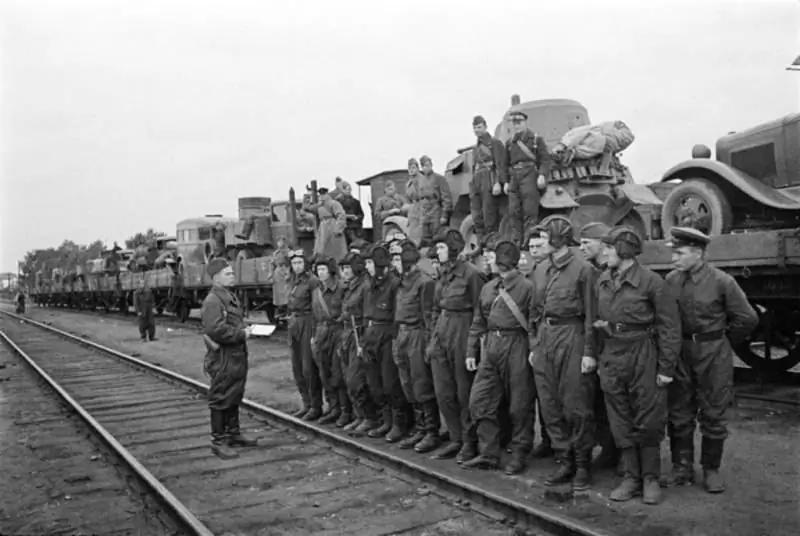
The following abbreviations are used in the article: IN - military district, gsd - mountain rifle division, GSh - General base, CA - Red Army, mk - mechanized corps, md - motorized division, RGK - reserve of the main command, RM - intelligence materials, sc (sd) - rifle corps (division), td - a tank division.
The article uses the designations of the VO or fronts: ArchVO - Arkhangelsk VO, DF - Far Eastern Front, ZabVO - Transbaikal VO, ZakVO - Transcaucasian VO, ZAPOVO - Western special VO, KOVO - Kiev special VO, LVO - Leningrad VO (Northern Front - Northern Front), MVO - Moscow VO, OdVO - Odessa VO, OrVO - Orlovsky VO, PribOVO - Baltic special VO, PrivO - Privolzhsky VO, SAVO - Central Asian VO, Siberian VO, SKVO - North Caucasian VO, UrVO - Ural VO, KhVO - Kharkiv VO.
In the previous part, it was shown that the plans for the deployment of the Armed Forces of the Soviet Union in the west in 1941 provided for the deployment of Germany for the war with our country from 180 to 200 divisions. On the side of Germany, the troops of Finland, Romania and Hungary could also fight. From March 11 until the start of the war, the number of spacecraft troops planned by the General Staff to counter enemy troops, as part of the western military units, in the LMO and in the armies of the RGK, changed insignificantly.
RM until 31.5.41 were unreliable and did not allow making an unambiguous conclusion about the beginning of the war on June 15 … 22. In the RM, there was a lot of misinformation about the deployment of German troops in the Balkans, about the preparation of a war between Germany and Turkey, about the presence of German troops on the territory of Turkey, about plans to bring German troops into Iraq and Syria. In the RM it was said about the imminent beginning of the war between Germany and the USSR, then it was said that the war was postponed until the defeat of England and the strengthening of Germany in the Middle East. As disinformation at different levels and in different countries, they threw in information about possible German demands. For example, about the long-term lease of grain lands in Ukraine or the lease of the Baku oil fields. It was said about the separation of Ukraine from the USSR … It was shown that as of May 31, the British special services also did not know whether there would be a war between the USSR and Germany, or these countries would conclude an agreement "very dangerous" for England.
Big fees
In the previous part, the issue remained unanswered, which is associated with an increase in the number of spacecraft. This is a matter of high fees. It is well known that about 800 thousand people were called up to the training camp. There are many articles on this topic. One of them is an article by Dmitry Shein.
As of 1.12.40 in the spacecraft, the 97th rifle division had 12,550 people, 9 md - 11,000 each, 10th rifle division - 9,000 each, 49th rifle division - 6,000 each, and 23rd rifle division - 3,000 each. In the spring of 1941, the spacecraft troops were transferred to the new peacetime states:
- 89 Rifle Division - for a staff of 4/100 - 10291 people with the enrollment of 4200 people to the state of wartime (staff 4/400 - 14483 people);
- 10th Guards Rifle Division - 4/140 staff - 8829 people (according to wartime states, 14163 people);
- 109 divisions - staff 4/120 - 5864 people with the adoption of 6000 people to the state of war.
At the beginning of 1941, the People's Commissar of Defense prepared a document on the number of persons liable for military service who needed to be attracted to training camps in 1941. On March 8, the Politburo of the Central Committee of the All-Union Communist Party (Bolsheviks) allowed the NCO to call for military training in 1941: 192869 people for 90 days, 25000 people for 60 days, 754896 people for 45 days, 3105 people for 30 days. A total of 975870 people.
Before the start of the war, NGOs did not fully use the limit on the number of conscripts involved in training camps: more than 170 thousand people were not drafted. Probably they were left to be attracted to training camps in the second peaceful half of 1941 …
In late March - early April, the volume of recruits involved in training camps in VO was determined. In April and May, there was a clarification of the number of conscripts involved in training for some divisions. The clarification was associated with the disbandment of a number of SDs and the formation of airborne and anti-tank brigades on their basis. The figure shows data on the number of recruits accepted by the VO divisions in accordance with the Note of the Chief of the General Staff Mob Directorate. It is indicated that the Note was prepared no later than 20.5.41.
It can be seen from the figure that 464,300 people will be called up to staff the rifle and mountain rifle divisions for the period of the training camp. Of these, 131,550 people, or 28% of the conscripts, will be called up to recruit the three western border districts and the LVO. Thus, a significant part of the assigned personnel was called up for training to staff the divisions of the internal districts. Divisions that, with the threat of a war with Germany, would move to the west.
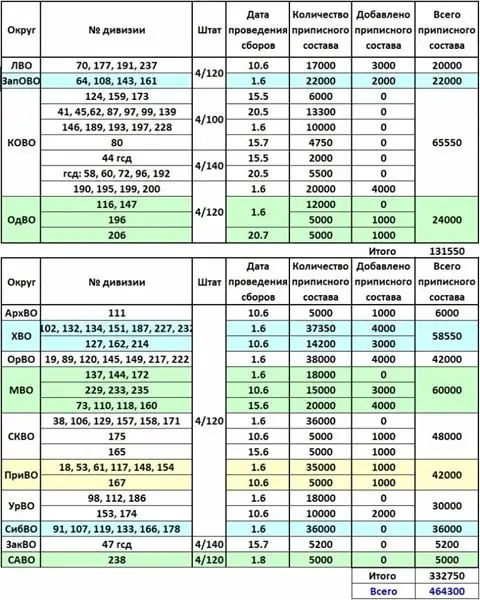
The table does not contain data on PribOVO, which submitted an application a little later. According to the historian S. L. Chekunov, the training camp in this district was supposed to begin on June 24. Basically, the assigned personnel for these divisions was called up for 45 days and had to be in formations from 1 … 15 to 15-30 July. Probably, during this period, the General Staff expected the start of a war with Germany or a postponement from the war for some time … The rest of the personnel called up for training served to replenish units and formations of other branches and types of troops, as well as to recruit some rear structures.
Events in the Balkans and the Middle East region
Turkey. 19.10.39 a British-French-Turkish military alliance was concluded on mutual assistance in the event of the transfer of hostilities to the Mediterranean region. In the spring of 1940, hostilities affected the region, and the Allies demanded that Turkey fulfill its obligations. However, the government declared Turkey a "non-belligerent country". After the defeat and occupation of France, Germany's position in Europe was significantly strengthened. The Turkish government was forced to balance between a strong Germany and England, which was still trying to maintain its position in the Balkans.
In the summer of 1940, an agreement was signed on Turkish-German economic cooperation. At the same time, a similar agreement was in force with England. In the spring of 1941, Germany captured Yugoslavia, defeated the Anglo-Greek troops, and captured Greece. German troops approached the Turkish border. Turkey could repeat the fate of other countries: either become an ally of Germany, or be captured by her troops.
In March 1941, a pro-German government came to power in Iraq. On April 8, Churchill noted:
On April 18, an English infantry brigade landed in Basra, and in May the Anglo-Iraqi war began, which lasted 30 days. The Iraqi government hoped for the arrival of German ground troops, but only German and Italian air units arrived. On June 1, a government was established in Iraq that was guided by England. Now British troops at any time could be at the border of Turkey and Iran.
In April and June 1941, the Turkish government refused to allow British troops heading to fight in Iraq and Syria to pass through its territory. Also, the Turkish government refused to let the Wehrmacht troops through its territory, which were planned to be sent to Iraq and Syria. 18.6.41 a treaty of friendship and non-aggression was concluded with Germany.
Iran. Back in the 1920s, Iran made a bet on Berlin in its confrontation with London or Moscow. In 1928 the Germans took part in the creation of the "National Bank of Iran", and in 1929 the Iranian-German treaty of friendship and cooperation was signed. In 1937, an army conspiracy was uncovered to overthrow the Shah and establish a Nazi dictatorship. The participants in the conspiracy were executed, but in the absence of an alternative, Iran continued to maintain good relations with Berlin.
In 1940, the Germans began building a Nazi city in Iran, in which members of the National Defense youth organization took part. A large number of books, brochures and leaflets were brought to Iran. Movies glorifying the power of German weapons were provided free of charge in cinemas. The Germans recruited and bought owners of influential newspapers, using the Iranian press as their propaganda mouthpiece. Pro-Nazi youth and officer organizations began to multiply throughout the country. By 1941, Germany occupied more than 40% of the total trade turnover of Iran.
Since April 1940, Germany has supplied military equipment and weapons to the Iranian army. Supporters of Germany were in all the power structures of the country and the army. The territory of Iran was used to conduct espionage and subversive work against the USSR and to disorganize the most important areas of the Soviet rear. The country was a springboard for an attack on British possessions in India, and could also serve as the basis for an attack on the southern borders of the Soviet Union. 25.6.41 Berlin officially demanded that the Iranian government enter the war on the side of Germany.
Since the spring of 1941, the situation on a part of the southern border of the Soviet Union has become more and more tense …
Advancement of the 16th Army
There are no published documents concerning the nomination of the 16th Army. Its true route will have to be restored based on the memories of veterans and on the basis of an analysis of documents that at first glance seem to be far from the fate of the 16th Army.
The memoirs of A. A. Lobachev, a member of the Military Council of the 16th Army, are most often used in the discussion. The author will also not change traditions.
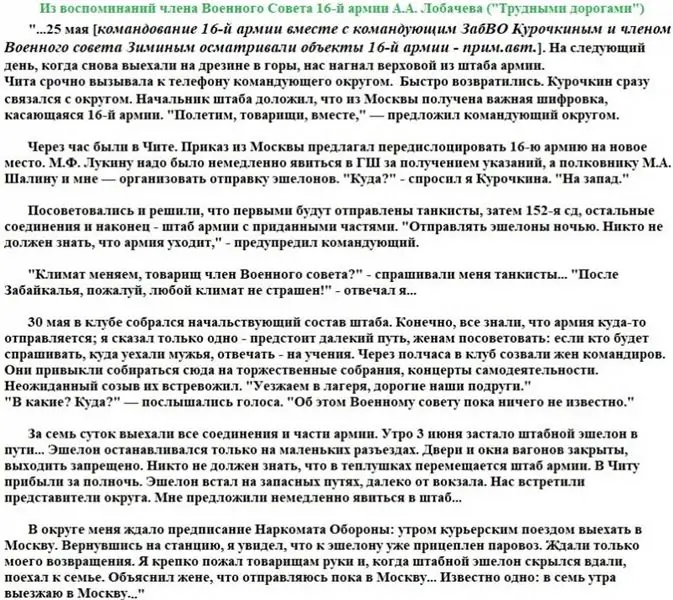
From the memoirs it is clear that the commander of the ZabVO does not know where the army is headed. He only knows about the direction to the west. The order to begin the redeployment was brought to the command of the district and the army unexpectedly on May 25. The memoirs do not say anything about whether the command and personnel knew about the expected change of location after the General Staff Directive of April 26.
It should be noted that of the connections of the 32nd SC, one 152nd SD is mentioned, and this is not accidental. The second division of the 32nd rifle division (46th rifle division) from April 1941 was kept on a staff of 4/120, i.e. had less than 6,000 personnel. Before the start of the war, the ZabVO did not plan to call on the assigned personnel to replenish its SD. Therefore, this division was not ready to head west. And this is correct, because neither May 25, nor June 15, no one expected the outbreak of war with Germany. The division remained in the ZabVO, awaiting an order for mobilization, and after mobilization (at the end of June) was sent to the west (where it arrived on 7/14/41). It turns out interestingly: the 16th Army is supposedly sent to the west for the war, and one of its divisions is not staffed, although the funds for conscripts remained in the NKO. This incident is in no way similar to the departure of the 16th Army for the war on June 22 …
A similar situation is observed with two DF divisions: the 21st and 66th. Both divisions were supposed to head west in May 1941, but it turned out that they were not particularly expected in the west … War was not expected there … The transfer of the 21st rifle division began only in August, and the 66th rifle division remained in reserve front.
Next, consider an excerpt from the book "Commander Lukin", which confirms the information contained in the memoirs of A. A. Lobachev.
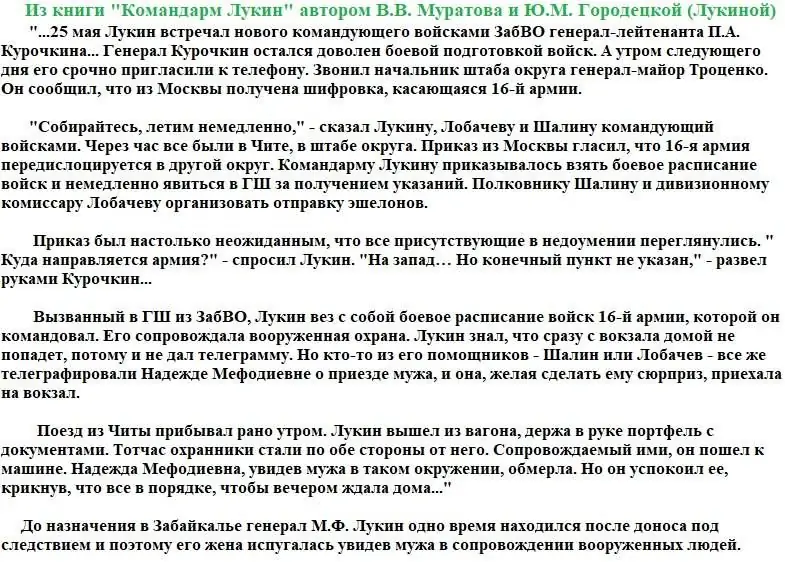
In the memoirs of I. U. Moskvin says that they learned about the upcoming redeployment in early May. This is closer to the truth. It is said about the transfer to the west or about the withdrawal to the camps near Chita.
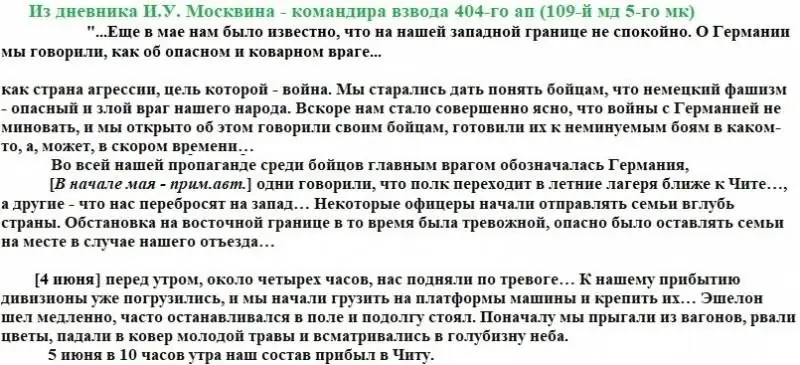
What else is interesting in memories? First: the echelons of the 5th MK continue to decrease even after June 3 - the period named by A. A. Lobachev, the deadline for sending army formations. Second, there is no mention of camouflaging weapons and equipment for transporting them. It seems that only the tanks and the very fact of transporting tanks somewhere were carefully masked. The tankers were even forced to remove the emblems from their buttonholes.
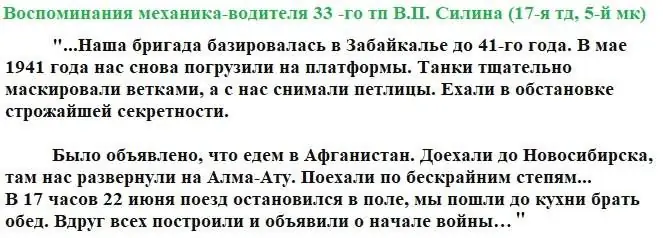
In the memoirs of V. A. Giga from the 17th MP also does not talk about the camouflage of automobile equipment. And it is somewhat difficult to disguise three cars on two platforms …

Consider the memories of a military doctor of the 333rd artillery regiment of the 152nd rifle division B. M. Feoktistova.
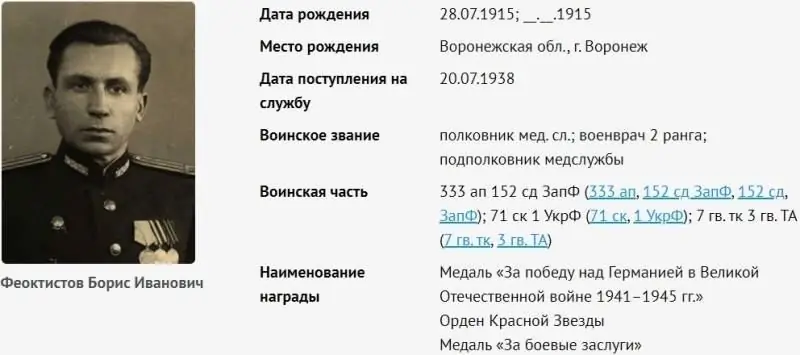
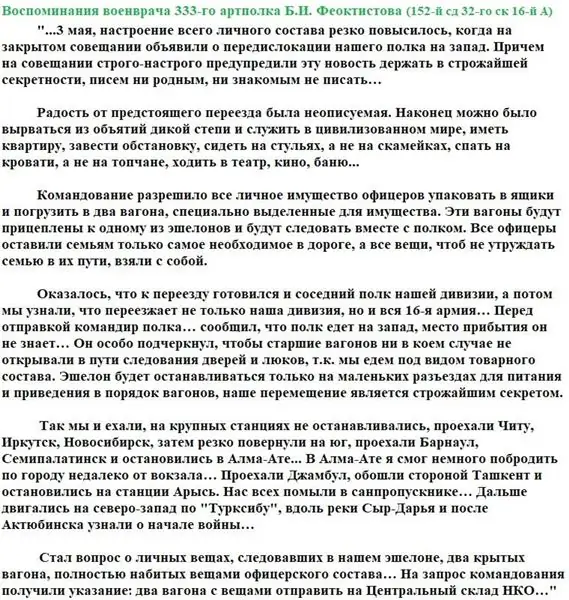
All the same, the soldiers of the 16th Army learned about the redeployment in early May. They announced a redeployment to the west. Families were allowed to pack and load things in crates. The artillery regiment entered two carriages intended for the commanders' belongings. The memoirs did not mention any problems with the delivery of things to the Central Warehouse of the NPO - this was probably a common thing during transportation. It is likely that other units of the 16th Army could carry the commanders' belongings with them …
Husbands took almost all the things from the house, leaving the bare minimum. Still, in the large city of Alma-Ata, the train stopped, and it was possible to take a walk not far from the station. This fact, of course, could not add secrecy in the transport of troops …
In addition to the troops of the 16th Army, the 57th TD, which was stationed at the border on the territory of the Mongolian People's Republic, was also heading to the west. Consider the memories of the commander of the 57th TD V. A. Mishulina. The visit of the ZabVO commander at the end of April is very similar to checking the connection for dispatch in accordance with the General Staff Directive of April 26. The commander did not inform the command of the formation about the upcoming transfer.
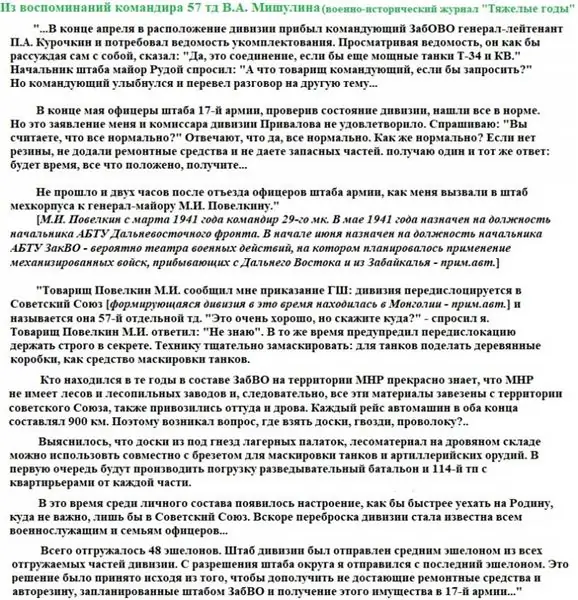
For the covert redeployment of the 57th TD, not only tanks, but artillery pieces had to be masked from the border. Again, the personnel learned about the fact of redeployment, which could not contribute to the secrecy of transportation. I wonder: how strong was the Japanese intelligence service near the border in Mongolia?..
Information from the special services, received in early June
On June 3, a message was received from an agent of the 2nd Directorate of the NKGB:
On the western borders of the Soviet Union, the Germans concentrated about 150 divisions … The beginning of hostilities is expected on June 15 or 20. Germans prepared myself also the possibility of an offensive from the south … On this occasion, an agreement was reached with Turkey … A large-scale environment has been prepared …
W. Churchill:
On June 5, the Joint Intelligence Agency reported that, judging by the scale of German military preparations in Eastern Europe, there was apparently a more important issue at stake than an economic agreement. It is possible that Germany wants to remove from its eastern border the potential threat of the increasingly powerful Soviet armed forces. The management did not yet consider it possible to say whether the result will be war or agreement …
Note to the deputy. People's Commissar of State Security of the USSR with the text of the conversation obtained by secret service on 6.6.41:
On June 9, Schiller received a message:
… the action against the USSR by the Germans was prepared both militarily and economically, and was supposed to be at the end of May of this year. Reason for presentation: economic and economic tensions between both countries.
If the war with England is not over before the fall, then the Germans intend to occupy Ukraine and Donbass to provide themselves with coal and iron, which will happen regardless of the proposals and concessions that we make under the threat of conflict. If the war ends before the fall, then a deal with the USSR is possible without an armed conflict.…
Message from the Sergeant Major on June 9:
Towards June 10th, the messages start to get more alarming.






